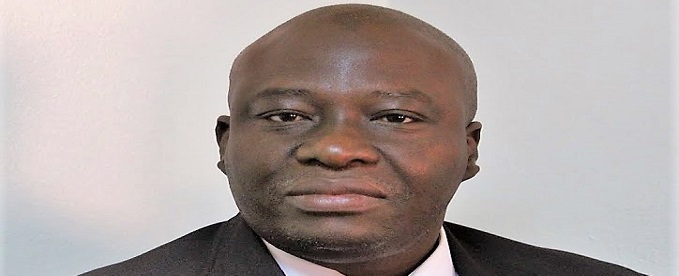Broadcasting
NBC Says no Going Back on New Broadcasting Code

Armstrong Idachaba, director-general of the National Broadcasting Commission (NBC), says the commission is not backing down on the controversial amendment to the country’s broadcasting code.

Idachaba said the new broadcasting code is to break the monopoly of “greedy capitalists” who “call themselves dominant players” and allow local payTV platforms to thrive.
In March 2020, the NBC released the 6th edition of its broadcasting code, which mandates sub-licensing of premium content and kills the idea of exclusivity.
Broadcasters, columnists, and Multichoice, one of the dominant players in the Nigerian payTV industry, have spoken against the code, which they say further stifles the growth of the industry.
But Idachaba disagrees; according to him, “the amendments have been made, no going back because we believe it is good for our country, they are already operational”.
Speaking with Osasu Igbinedion on The Osasu Show, Idachaba said the NBC has licenced several local payTV platforms, but they do not survive due to the presence of the likes of DStv.
When asked about the negative effect the lack of exclusivity clause may have on DStv, Idachaba said: “Let me give you a poser as background: Why is it, have you ever thought, that our local tv, cable, paid services are nonexistent? There is no Nigerian that is active on the payTV platform, no Nigerian company.
“NBC licenced several, up to 30 Nigerian firms to offer paid television services in Nigeria and none of them succeeded. Why, because they cannot compete in the international content market.
“And what happens to the international content market, the people with the big purse, the global capitalist, those that call themselves dominant players, they go to acquire those rights and keep it to themselves in the guise of exclusivity and deny all other operators an opportunity for sublicensing.
“What does that do? What it does is to create a monopolistic economy for whoever is the buyer of that content and the person is able to maximize profit unhindered. That is why you find internet penetration in Nigeria is increasing by the day. That is why you find that all those big monopolies break even and make tonnes of money.
“What we are saying is that when you go to acquire these rights, because you are acquiring them for the Nigerian market, because your intent is to exploit the Nigerian audiences and viewers, we want you also to give back by sublicensing to local Nigerian players that may be interested.”
Idachaba said DStv must now sub-licence the English Premier League to other players in the industry, who may be interested.
“If you bring EPL for instance and say I am the owner of EPL, only me can show EPL and on my platform alone, so whoever wants to watch premier league would have to buy DStv, even if you have Startimes, you cannot watch,” he added.
“If you are on open television, the open terrestrial, where low-income earner, those on the lower social ladder, where they thrive, then they are denied which is class stratification in itself on account of content acquisition.
“We are saying create these windows. If you get the rights, fine, we welcome you, invest in Nigeria, but create channels for sublicensing”
Confronted with the fact that Multichoice, the owners of DStv, don not have the rights to sub-licence the English Premier League (EPL) Idachaba said “whoever is giving them the rights has to understand” that there is a new NBC code.
“If you are going to acquire your rights, you know that in the Nigerian Broadcasting Code, we have plainly said you can’t have exclusive right. So whoever, if giving you that right has to understand that he cannot give it to only you in Nigeria.
“If any other Nigerian is interested in that right, they must also discuss at mutually agreed price. Because what has happened over time is that this exclusivity is used to shut other people who are willing to participate. You shut the window.
“How then do you develop an economy? We have thousands of young promising Nigerian entrepreneurs, you know that premium content derives advertising. If these channels are made available at lower window levels through sublicensing to local little operators, they too will be able to attract some level of advertising.
“But Capitalist are greedy, they are extremely self-centered, they don’t want to give it out. But we know it is important for our own economy and creative subsectors that this happens.”
The DG, who has worked at NBC for over 28 years called on Nigerians to “have an ideological, philosophical understanding of the motive of the policy, what does it intend to achieve”.
He said the policy is to “redynamise and redistribute wealth in a way that there would be more participation, more engagement and more opportunities”.
“What makes the capitalist think that by keeping content to themselves, they maximize all the profits? Chances are that by sublicensing, you make more. The more you share to people based on the agreed sum, you are more likely to make more money quickly. It doesn’t reduce your own large share but creates open windows.”
Broadcasting
Pheelz Shares His Journey on Glo-Sponsored African Voices

Nigerian singer, songwriter and producer Pheelz (Phillips Kayode Moses) is set to feature this weekend on African Voices Changemakers, the flagship magazine programme on CNN International.

The 30-minute episode, sponsored by digital solutions company Globacom, premieres on Saturday, February 21, 2026. In a candid sit-down with host Larry Madowo, Pheelz opens up about his journey from church musician to global hitmaker, reflecting on the intersections of faith, fame and the expanding influence of Afrobeats on the world stage.
Now 31, Pheelz began his musical path as a multi-instrumentalist in church before earning widespread acclaim in 2012 as the producer behind the hit tracks “First of All” and “Fucking with the Devil” on Olamide’s YBNL album. His rapid rise saw him named among NotJustOk’s Top 10 Hottest Producers in Nigeria in 2013.
He further solidified his reputation by producing nearly every track on Olamide’s Baddest Guy Ever Liveth, earning nominations at The Headies 2013 and in the Producer of the Year category at both The Headies 2014 and the Nigeria Entertainment Awards. In 2020, he clinched The Headies Producer of the Year award, and in 2021 secured the Soundcity MVP Award for Best Collaboration for “Finesse,” his smash hit with Bnxn (formerly Buju).
On the programme, Pheelz reflects on the experiences that shaped his sound and creative philosophy, discusses landmark collaborations, shares his perspective on artificial intelligence and artistry, and explains why sound, storytelling and culture remain central to African music’s global resonance.
The show airs on DSTV Channel 401 at 8:30 a.m. (WAT) on Saturday, with repeat broadcasts at 12:00 noon the same day; Sunday at 4:30 a.m. and 7:00 p.m.; Monday at 4:00 a.m. and 6:45 p.m.; and Tuesday at 6:45 p.m. The broadcast schedule continues through Monday of the following week.
Broadcasting
Dr. Cairo Ojougboh Foundation Bolsters Nigeria’s Education Drive with ₦2.7m Student Support

Dr. Cairo Ojougboh Foundation has reinforced government’s educational development efforts in Nigeria through a targeted initiative honouring the late medical doctor and House of Representatives member, Dr. Cairo Ojougboh.

L-R: Son of the late Dr, Cairo Ojougboh, Mr. Nkem Ojougboh; Chairperson, Dr. Cairo Ojougboh Foundation, Mrs. Bose Ojougboh and another son, Mr. Orieka Ojougboh, during the event in Agbor, Delta State recently.
The foundation recently hosted a programme themed “Your Future, Your Choice” at St. Columba’s Grammar School in Agbor, headquarters of Ika South Local Government Area, Delta State.
It presented a cheque of ₦2,700,000 to cover examination fees for students preparing for West African Examinations Council (WAEC), National Examinations Council (NECO), and Junior Secondary School (JSS) 3 exams.
Academic excellence received further boosts with cash rewards for top students across the school’s nine academic arms, alongside distributions of notebooks and writing materials to enhance learning.
Chairperson Mrs. Bose Ojougboh, joined by her sons Mr. Nkem and Mr. Orieka Ojougboh, urged students to view challenges as stepping stones, embrace discipline, consistency, and focus, and make intentional choices shaping their futures.
“The school that moulded Dr. Cairo’s values deserves our support,” she said, highlighting the foundation’s commitment to inspiring hard work and personal growth.
Old Boys of St. Columba’s Grammar School, led by Elder Ndudi Agholor, attended in force, sharing nostalgic reflections and praising the school’s sustained high standards under current leadership.
School Principal Rev. Fr. Joseph Ugboh and Ika South LGA Chairman Engr. Jerry Ehiwarior lauded the initiative as “commendable and impactful,” calling for its continuation to preserve Dr. Ojougboh’s legacy of discipline, excellence, and service.
They noted the support had motivated students to pursue their goals with renewed determination, ending the event on a hopeful note.
Broadcasting
New Horizons Nigeria Breaks Ground: First to Fuse Mandarin into ICT Curriculum

In a landmark educational innovation, New Horizons Nigeria has become the first institution to integrate the Chinese (Mandarin) language into its ICT curricular as an elective, thereby positioning Nigerian students for relevance in the rapidly changing world order.

Mr. Tim Akano, Managing Director and CEO of New Horizons Systems Solutions Limited
New Horizons Nigeria is a leading ICT training and solutions provider committed to provide individuals and institutions with future-ready skills. Through innovative program, global partnerships, and strategic foresight, the organization continues to redefine education, workforce development, and global competitiveness.
With over 80% of global consumer products manufactured in China and China’s growing dominance in global supply chains and labour markets, New Horizons Nigeria recognizes the urgent need for the current generation to understand, speak, and engage with the Chinese language and culture. As global economic power dynamics evolve, the labour market is increasingly tilting towards China, making Mandarin proficiency a critical competitive advantage.
According to Mr. Tim Akano, Managing Director and CEO of New Horizons Systems Solutions Limited, Nigeria, the program represents far more than a language course.
He asserted that very soon, the global labour market is likely to increasingly reflect China’s influence rather than the predominantly western orientation it currently exhibits. Language will be a major differentiator and the first Chinese-speaking technology experts in Nigeria will have a significant advantage, especially in integration into Chinese companies operating locally and globally.
Therefore, New Horizons Nigeria has officially launched a Mandarin Scholarship Program with China Advancement Opportunity, selecting 100 outstanding students from five prominent Nigerian secondary schools. This initiative marks a major milestone in Nigeria–China educational cooperation and reflects a forward-thinking response to shifting global economic realities.
Furthermore, the scholarship program has commenced with an intensive three-month online Mandarin training and at the end of the program, the top-performing students will be selected strictly on merit. 20 outstanding students will receive an additional scholarship valued at $2,500 per students to participate in a one-year pre-degree Mandarin and cultural immersion program in China. From this group, the best candidates will progress to fully funded admission scholarships into top universities in China. This initiative is designed not only to build language proficiency but also to enhance global competence, international exposure, and cultural intelligence among Nigerian students.
Also, to maintain international academic standards, participating schools are required to comply with strict guidelines. They will be obligated to join the online classes ten minutes earlier, they must have a minimum of 85% attendance throughout the program, and must ensure they have a stable internet connectivity, reliable power supply and a conducive learning environment.
Therefore, School owners and administrators have been formally congratulated and strongly encouraged to nominate their most disciplined, and committed students, as advancement to the China program will be strictly merit-based.
However, apart from students, internation business men are equally encouraged to attend New Horizon’s Mandarin executive lessons which will equip them with basic Chinese language to enhance their business communications.
Additionally, while the pilot phase begins with selected secondary schools which includes Startrite School, Lightway School, British Nigerian Academy School, Honeyland Schools and Great Heights School, the Mandarin program will be available as an elective ICT course at all New Horizons retail centers.
This is done to extend access to students and learners beyond its partner schools and within one year, committed learners will be able to communicate effectively in Mandarin, which will open doors to global employment, trade, and cultural exchange.
In conclusion, a Mandarin Cultural Fiesta will be hosted, bringing together educators, students, institutional partners, and distinguished guests from China and Nigeria. The event will celebrate outstanding performance, cross-cultural exchange, and the strengthening of bilateral educational ties.
For enquiries and participation details, interested individuals are encouraged to contact New Horizons Nigeria via 08125541750

 Telecom3 days ago
Telecom3 days agoGroup Condemns Gabon’s Social Media Shutdown Amid Protests

 Telecom3 days ago
Telecom3 days agoIXPN Positions as the Regional Internet Exchange Hub for West Africa

 General News3 days ago
General News3 days agoHow JustMarkets Is Empowering African Traders with Global Market Access

 E-Business3 days ago
E-Business3 days agoMutual Benefits Assurance Settles ₦5.9bn Claims in January 2026

 Telecom3 days ago
Telecom3 days agoMenxtt NG Emerges as Nigeria’s Virtual IT Hub for Premium Devices, Solutions

 Broadcasting3 days ago
Broadcasting3 days agoPheelz Shares His Journey on Glo-Sponsored African Voices

 E-Business3 days ago
E-Business3 days agoNITDA DG Reaffirms FG Commitment to Responsible and Inclusive AI

 News3 days ago
News3 days agoAI-Driven Memory Chip Fuels Global Phone Price Surge


























